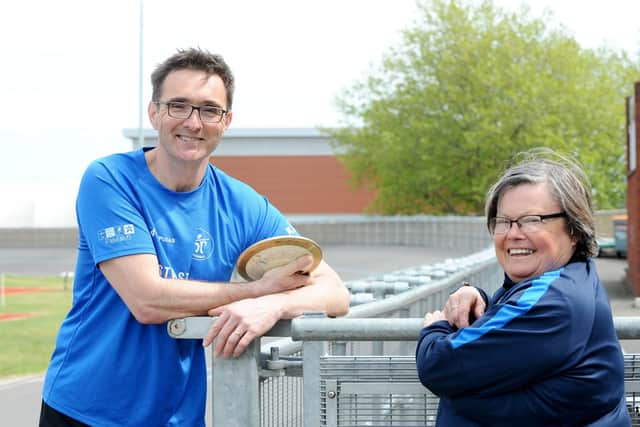Gosport dentist becomes para-athlete after MS diagnosis


Now, 14 years on, he’s a para-athlete and is aiming to compete for England. He believes that whatever life throws at you, it doesn’t have to stop you from living your dream.
Phil, a qualified dentist with his own practice, was diagnosed back in 2005. He had been married to his wife Laura for eight years and they had two young boys together.
Advertisement
Hide AdAdvertisement
Hide AdHis diagnosis came about after his face got stuck in a wonky smile on one side and it didn’t go down.


At the time he was working at Guy’s Hospital in London and he knew from his experience in medicine that it was either a brain tumour or some sort of neurological condition.
‘All I felt when I was told I had it was love,’ he recalls.
‘Love for my whole life and my children and my family. It’s very tough on your immediate family though.
‘It was a pretty bleak diagnosis. A lot of people associate MS with being in a wheelchair. People view it as an impairment.
Advertisement
Hide AdAdvertisement
Hide Ad‘A lot of people don’t ask for help. They want to be independent. People don’t want to be a burden on others.’
Phil, who lives in Alverstoke, Gosport, took on the Great South Run in 2006 and 2007, despite his diagnosis.
But it had an impact on his body.
‘It’s terrible,’ he says.
‘It just completely wipes you out. What most people get with MS is fatigue and things not working.
‘For me, my left arm would drop quite a lot. I thought it was an old rugby injury so I chose to ignore it.’
Advertisement
Hide AdAdvertisement
Hide AdBut in August last year, it started to impact on his work and he was forced to retire from working as a clinical dentist.
He is now the chairman of a local medical committee and represents people in the industry as well as mentoring people.
It was five years ago that he first became inspired to become a para-athlete, when he took a trip on a boat called Oceans of Hope.
It was organised to enable people with MS to sail around the world.
Phil sailed a leg from Portsmouth down to La Rochelle.
Advertisement
Hide AdAdvertisement
Hide Ad‘It was crewed by a Danish neurologist who decided that people with MS should continue to live their lives,’ Phil says.
‘When people are diagnosed, they are scared. He decided to have a boat that would sail round the world for people with MS.
‘It was crewed by a Paralympian. I remember at 4am, when the sun was coming up, I was told that I could become a Paralympian.
‘I felt very excited. I decided that I had to accept my disease.
Advertisement
Hide AdAdvertisement
Hide Ad‘Before, it was an inconvenience. When you talk to people with a similar disease you understand each other and you can accept it.
‘ Never did I feel cross. Everything was done with love .
‘ So I decided to throw in the Paralympics.’
Phil returned to Portsmouth and linked up with a Paralympic coach. Now he competes all over the country and internationally in shotput, discus and javelin.
He has gone on to win a gold medal at an international javelin competition in Finland.
So what is Phil hoping to gain from his experiences?
‘I want people to realise when they are diagnosed with a life changing illness that life will change. But, for me, it’s for the better.
Advertisement
Hide AdAdvertisement
Hide Ad‘It’s how you respond to it that’s important, as is the support of friends and family.
‘Now I am working less I can focus more on sport. I am aiming to get on the England team. Sport can be for everybody. ‘There are different categories and everyone should be encouraged to do sport.
‘It’s about learning how to balance your life so that you can cope with things.’
Phil has a very positive approach to his illness.
‘I view it as a gift,’ he says.
‘I wouldn’t choose it. I wouldn’t wish it on anyone but I am a positive person and it’s given me so much. I have met some wonderful people.
Advertisement
Hide AdAdvertisement
Hide Ad‘It’s taught me humility and understanding and compassion. Some of these people will feel that they aren’t valued or a part of society. They don’t feel involved.
‘I’ve got a very severe scarring on my brain. My way of dealing with it is humour.
‘Humour is something British people understand. It’s such a healing tool.
‘Banter is really healing for people with disabilities.’